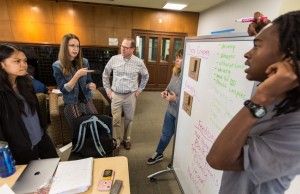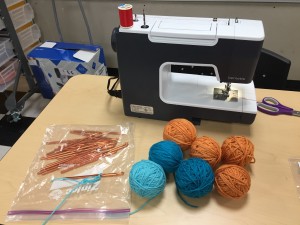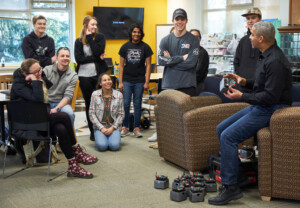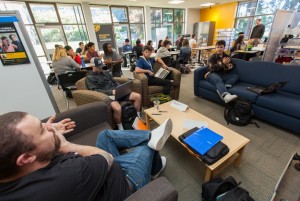A History of the Innovation Studies Makerspace
Creative Space Changes its Emphasis in 2024

By Michael Halvorson ’85
When Innovation Studies took shape in 2016-2017, PLU’s students and faculty dreamed together, establishing both an Innovation Studies minor and a student-led Makerspace on the ground floor of Hinderlie Hall.
The second idea requires some explanation, because a change is coming.
Eight years ago, Hinderlie residents agreed to loan their ground floor lounge to the Innovation Studies program for a Makerspace experiment, a cooperative idea that borrowed concepts from urban design, high-tech labs, digital classrooms, and kindergarten play spaces.

Real-world innovation work requires collaboration and the creative use of new materials. (Prof. Halvorson, center)
PLU’s idea was to supply simple tools and creative materials to students at no charge, and let visitors build anything they wanted, for class projects or personal enjoyment. As co-founder of the Innovation Studies program, Professor Michael Halvorson (History) had toured Innovation spaces in Southern California on a scouting trip, and decided to partner with a campus group that would help him build one.
As the experiment took shape, students and faculty contributed art supplies, electronics, Lego, paint, sewing machines, and more. Campus Life supplied the space and promised to help with programming and teaching campus creatives to tidy up after their experiments.
Between 2017 and 2024, the space was operated jointly by Innovation Studies and residential leaders in Hinderlie Hall. Prof. Halvorson supervised and paid Makerspace student interns during most of these years, using funds donated to Innovation Studies. He also coached students on how to operate a creative space and support students who needed encouragement.
Over the years, many of the Makerspace interns became experts at finding materials and planning events to foster community and support student well-being. (It turns out that crafting is very good for you.)
Campus Life supplied programming support and some staff, and campus partners from the President’s Office to Facilities to the School of Business pitched in.
Students learned to recycle clothing, operate sewing machines, experiment with electronics, make holiday cards, build Lego castles, and construct crochet hats. Many Business students planned their first enterprises in the center, and Innovation students studied human centered design, prototyping, and video game mechanics using its resources.
Campus faculty and visiting scholars arrived to teach design thinking, explore music composition, program robots, and more.
Over time, people from outside of the local Hong and Hinderlie community found the space, and many enjoyed using it. Free butcher paper and supplies allowed students to make signs to support athletic teams and participate in advocacy efforts on and off campus. Faculty from Innovation Studies, the School of Business, History, English, Psychology, and Music regularly used the space.
The Movement Evolves
During 2023-2024, Campus Life and Innovation Studies evaluated how the Makerspace was doing, and learned that student demand for the space had fallen off significantly, especially among non residents.
The reason? A number of so-called “third spaces” had arisen on campus to provide similar outlets for creativity, collaboration, and crafting.
These spaces included the digital lab in Mortvedt Library, the Art Collective room in Ingram, a clubs and organizations craft space in AUC, and the digital recording labs in the Martin J. Neeb Center. PLU also has design and pottery studios in Ingram, a set design workshop in KHP, and a new collaboration zone on the ground floor of the Rieke Science Center.
Few of these spaces existed when the Hinderlie Makerspace was envisioned in 2016-2017. Although the Innovation Studies minor continues to flourish, attracting students who study design and innovative thinking across campus, the Makerspace is no longer a central classroom for innovation, art, or entrepreneurial activity.
A reality connected to crafting and painting has also set in: It has become challenging to keep the space clean with limited staff support. RAs are stretched thin across multiple facilities, and Campus Life has needed to shift its resources elsewhere, where there is greater student involvement and need.
A Creative Lounge, Once More
In mid-November 2024, the ground floor lounge of Hinderlie Hall returned to its original use–a creative lounge space open to residents and guests that encourages creative thinking, personal projects, and smaller events. Hinderlie Ground Floor is a lounge once more, but with its creative spirit left intact.
“We’re delighted to have participated in this creative partnership,” said Prof. Halvorson, who still teaches in the Innovation Studies program. “PLU’s redesign of the Makerspace in 2016-2017 was a true community effort that brought in a range of valuable assets–new lighting, new windows, an upgraded entrance, a creative mural, and an accessible ramp for better access. The University also added movable chairs, tables, white boards, and cabinets for artistic projects. All of these additions to Hinderlie will remain in the space, for the use of future residents and guests.”
 Innovation involves experimenting, evolving, and learning, in a constant rhythm that respects community needs and looks positively to the future. The Makerspace movement at PLU continues and is ever-changing, evidenced both in our curriculum and in the growth of third-spaces on and off campus.
Innovation involves experimenting, evolving, and learning, in a constant rhythm that respects community needs and looks positively to the future. The Makerspace movement at PLU continues and is ever-changing, evidenced both in our curriculum and in the growth of third-spaces on and off campus.
Junichi Tsuneoka, the incoming director of Innovation Studies, writes, “Creativity is at the heart of everything we do in Innovation Studies, and we’re excited to share it with you! Our dynamic curriculum and strong local partnerships are designed to meet community needs and celebrate the unique strengths of PLU. Whether you’re a current student or considering joining us, we warmly invite you to take a class, attend a lecture, or bring your creative ideas to the program.”
In short, Innovation Studies is excited for what’s next.




